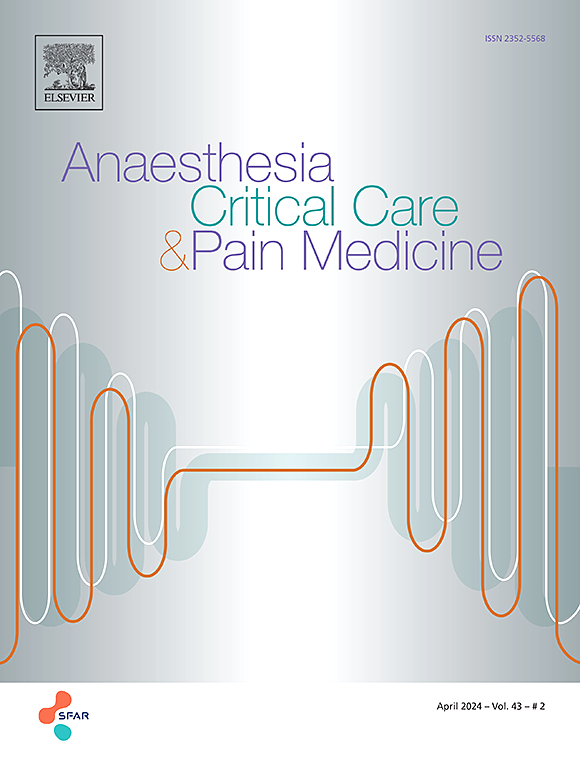急诊环境中的抗凝管理:法国急诊医学学会(SFMU)、法国麻醉和重症监护医学学会(SFAR)、法国血栓和止血学会(SFTH)和法国围手术期止血工作组(GIHP)的2024指南。
IF 4.7
3区 医学
Q1 ANESTHESIOLOGY
引用次数: 0
摘要
目的:法国本文章由计算机程序翻译,如有差异,请以英文原文为准。
Anticoagulant management in Emergency settings: 2024 guidelines from the French Society of Emergency Medicine (SFMU), the French Society of Anaesthesia and Intensive Care Medicine (SFAR), the French Society of Thrombosis and Haemostasis (SFTH) and the French Working Group on Perioperative Haemostasis (GIHP), endorsed by the French Neurovascular Society
Objective
The Société Française de Médecine d'Urgence (SFMU), the Société Française d'Anesthésie et de Réanimation (SFAR), the Groupe d'Intérêt en Hémostase Péri-opératoire (GIHP) and the Société Française de Thrombose et d'Hémostase (SFHT) have collaborated to propose a set of guidelines on the management of anticoagulants in an emergency setting.
Design
A group of French and Belgian experts from the French Societies of Emergency Medicine (SFMU), Anaesthesia and Intensive Care (SFAR), the working group on Perioperative Haemostasis (GIHP) and the French Society of Thrombosis and Haemostasis (SFHT) was convened. Any potential conflicts of interest were officially declared at the start of the recommendation development process, which was conducted independently of any industry funding. The authors used the GRADE ("Grading of Recommendations Assessment, Development and Evaluation") methodology to assess the level of evidence in the literature.
Methods
Five areas were defined: (1) The role of laboratory testing in determining anticoagulant use and the level of anticoagulation; (2) Management of anticoagulant-associated bleeding; (3) Management of asymptomatic overdoses; (4) Management of non-elective invasive procedures on anticoagulants; and (5) Thrombolysis for acute ischaemic stroke on anticoagulants. For each field, the aim of the recommendations was to answer a certain number of questions formulated by the experts according to the PICO model ("Population, Intervention, Comparison, Outcome"). Based on these questions, an extensive bibliographic search from 1990 onwards was carried out using predefined key words according to the PRISMA recommendations. Data quality was analysed using the GRADE method. Recommendations were formulated using the GRADE method and then voted on by all the experts using the GRADE grid method.
Results
The experts' summary work and application of the GRADE method resulted in 103 recommendations concerning 21 questions. After two rounds of voting and several amendments, strong agreement was reached on 97 recommendations. Out of these recommendations, 19 have a high level of evidence (19 GRADE 1), 35 have a low level of evidence (35 GRADE 2), and 48 are expert opinions. Finally, for one question, no recommendation could be made.
Conclusions
There was strong agreement among the experts to provide recommendations for clinicians to provide up-to-date management of patients on anticoagulants in an emergency setting.
求助全文
通过发布文献求助,成功后即可免费获取论文全文。
去求助
来源期刊

Anaesthesia Critical Care & Pain Medicine
ANESTHESIOLOGY-
CiteScore
6.70
自引率
5.50%
发文量
150
审稿时长
18 days
期刊介绍:
Anaesthesia, Critical Care & Pain Medicine (formerly Annales Françaises d''Anesthésie et de Réanimation) publishes in English the highest quality original material, both scientific and clinical, on all aspects of anaesthesia, critical care & pain medicine.
 求助内容:
求助内容: 应助结果提醒方式:
应助结果提醒方式:


